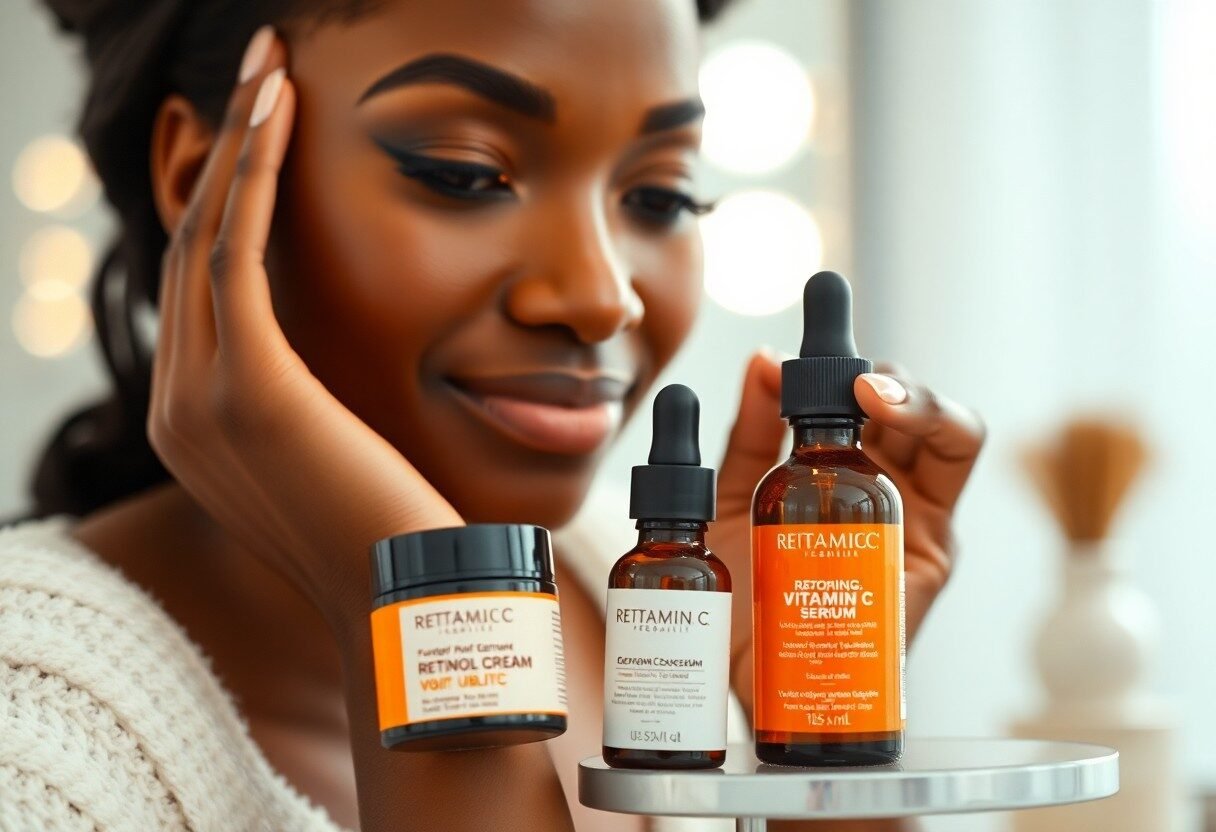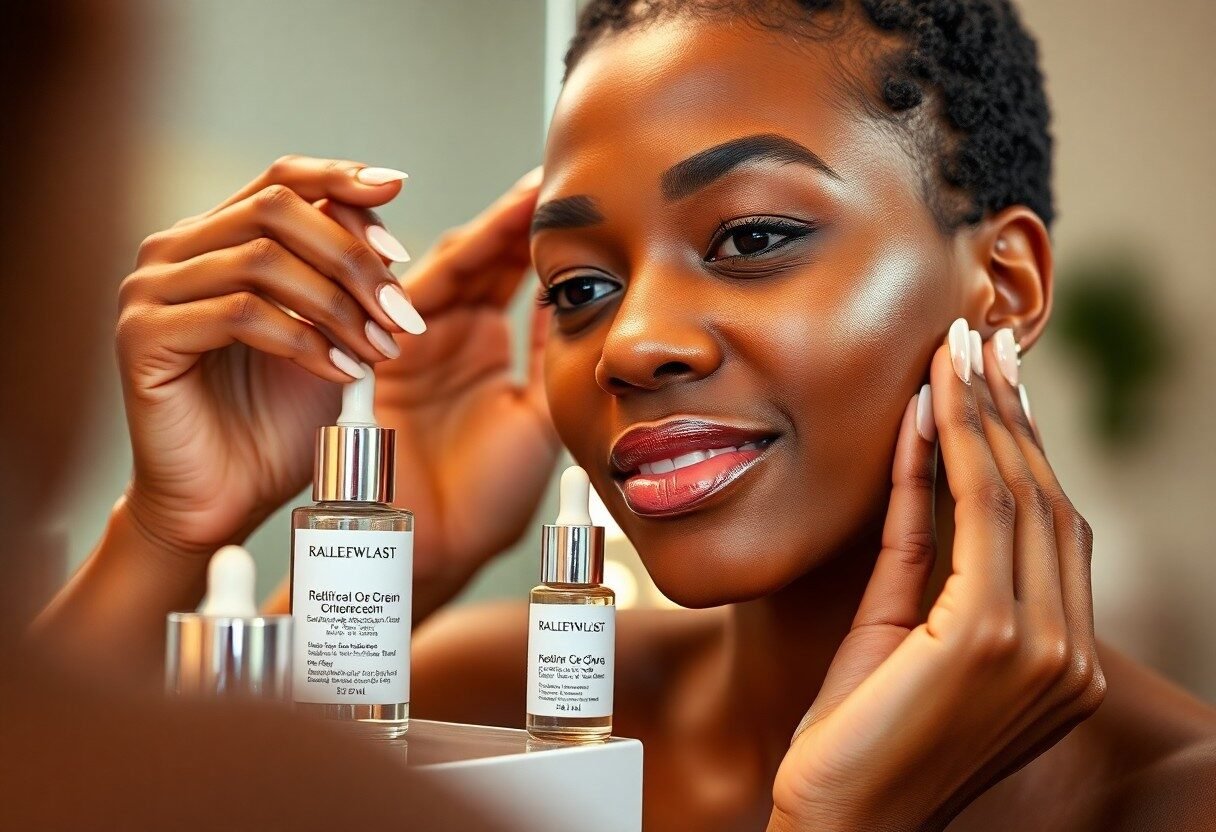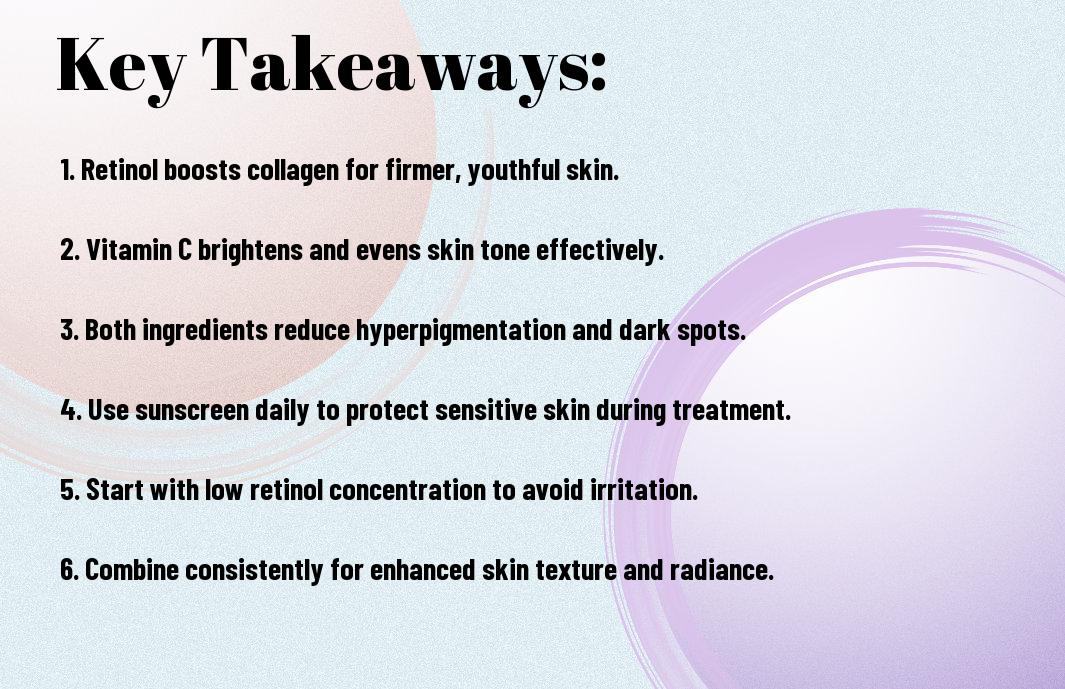
Vitamin C is a powerhouse ingredient, particularly for my African American sisters striving for radiant skin. Both retinol and vitamin C work synergistically to boost collagen production, combat hyperpigmentation, and improve skin texture. By incorporating these ingredients into your skincare routine, you can effectively tackle common concerns like uneven skin tone and fine lines. However, it’s necessary to be aware of potential irritation when using retinol, so I suggest starting slowly and consulting a skincare professional. Empower your skincare journey and unlock the brilliance of your beauty with these transformative ingredients!

Key Takeaways:
- Retinol aids in cell turnover, promoting a smoother and more even skin texture, beneficial for various skin tones.
- Vitamin C is an antioxidant that brightens the skin and helps to reduce hyperpigmentation, a common concern among African American women.
- Combining retinol and vitamin C can enhance the overall effectiveness of a skincare routine, addressing both aging and skin tone issues.
- Both ingredients can help combat acne scars and other blemishes, making them suitable for sensitive skin types when used correctly.
- Patch testing is advisable before incorporating these active ingredients, as individual skin reactions can vary.
- Using sunscreen daily is imperative when incorporating retinol, as it can increase sensitivity to sunlight.
- Consistency in usage is key; results may take time, so patience is important when using these powerhouse ingredients.

The Skin’s Unique Needs: A Focus on African American Complexions
Melanin’s Role in Skin Resilience
Melanin provides a natural advantage when it comes to protecting the skin from harmful UV rays. This pigment not only contributes to the rich tones of our skin but also offers a level of resilience against sun damage and premature aging. Consequently, while you may experience lower rates of skin cancers, it’s vital to remember that melanin does not eliminate the need for sun protection. Even with higher melanin levels, safeguarding your skin remains a top priority.
Common Skin Concerns in African American Women
Many African American women face unique skin challenges, such as hyperpigmentation, uneven skin tone, and dryness. These issues can stem from heredity, hormonal changes, and environmental factors that affect skin health. Understanding these specific concerns enables you to tailor your skincare routine effectively.
Hyperpigmentation, in particular, is a prevalent issue. After experiencing acne or minor skin injuries, dark spots can linger for months or even years. Studies reveal that up to 70% of African American women deal with post-inflammatory hyperpigmentation. Additionally, rough patches or dryness can arise from changes in climate or even from using products that are not suited for your skin type. Addressing these conditions with targeted treatments like retinol and vitamin C can significantly improve your skin’s appearance and health, making it vital to choose products that cater to your distinct needs.
The Transformative Benefits of Retinol: A Closer Look
How Retinol Works at the Cellular Level
Retinol, a derivative of Vitamin A, penetrates the skin cells and boosts cellular turnover. By stimulating the production of new skin cells, it encourages the shedding of old, damaged ones. This process aids in enhancing skin texture and improves the overall look of your complexion, making it smoother and more radiant. As the cells regenerate, retinol also triggers collagen synthesis, which is vital for maintaining skin elasticity and firmness.
Addressing Hyperpigmentation and Fine Lines
Retinol effectively reduces the appearance of hyperpigmentation and fine lines, both common concerns among African American women. By promoting cell turnover, it helps to fade dark spots while simultaneously smoothing out wrinkles. This dual-action makes retinol a powerful tool in your skincare arsenal.
For those grappling with post-inflammatory hyperpigmentation, a frequent issue caused by acne or skin trauma, retinol can be particularly effective. It gradually diminishes discoloration by encouraging the turnover of skin cells, which leads to a more even skin tone. Studies have demonstrated that consistent use of retinol can yield significant results, with users reporting a reduction in fine lines and an improvement in skin brightness within just a few weeks. This makes it not only a treatment option but also an investment in long-term skin health.
Vitamin C: An Antioxidant Powerhouse for Radiance
The Mechanism of Vitamin C in Skin Repair
Vitamin C works at the cellular level to facilitate healing and repair damaged skin. Its potent antioxidant properties neutralize free radicals, which are harmful molecules that can cause premature aging and skin damage. By stimulating collagen production, Vitamin C effectively enhances skin elasticity and reduces the appearance of fine lines and wrinkles. This dual-action approach not only promotes a healthier complexion but also fortifies skin against environmental stressors.
Brightening Effects and Impact on Even Skin Tone
The brightening effects of Vitamin C are remarkable, particularly for African American women who may experience hyperpigmentation. This antioxidant combats dark spots and uneven skin tone by inhibiting melanin production, making your skin appear more luminous. Regular use can create a more uniform and radiant complexion, elevating your overall skin health.
Incorporating Vitamin C into your skincare routine can dramatically transform your skin’s appearance. Powerful yet gentle, it helps fade existing dark spots—often a concern for women of color—while preventing new ones from surfacing. After a few weeks of application, not only do I notice my skin tone appears more balanced, but it also feels invigorated and fresh. The combination of these brightening properties and antioxidant benefits makes Vitamin C an crucial component for enhancing radiance and achieving a vibrant, even complexion.
Maximizing Results: The Perfect Pairing of Retinol and Vitamin C
Synergy Between Ingredients: Unlocking Enhanced Benefits
Combining retinol and vitamin C creates a powerful synergy that elevates your skincare routine. Retinol boosts cell turnover, allowing vitamin C to penetrate deeper and deliver its antioxidant benefits more effectively. This duo not only brightens the skin and reduces hyperpigmentation but also promotes collagen production, resulting in a more youthful complexion. Studies reveal that layered application can enhance efficacy, validating the importance of using these two ingredients together for robust skin health.
How to Layer Products for Optimal Efficacy
Layering vitamin C and retinol correctly maximizes their benefits. Start by applying vitamin C in the morning, which protects skin from environmental damage throughout the day. After your skin has absorbed it, follow with a broad-spectrum sunscreen. In the evening, cleanse your skin thoroughly, then apply retinol. Give it a few minutes to absorb before applying a moisturizer. This method enhances each product’s efficacy while minimizing potential irritation from retinol.
A common strategy involves incorporating these ingredients into separate time slots within your skincare routine. For instance, I apply vitamin C serum after my morning cleanse, allowing it to shield my skin from free radicals and UV damage. In the evening, I shift to retinol, using a gentle cleanser and waiting for a few minutes post-application before layering my moisturizer. This approach takes advantage of their unique properties while ensuring that your skin remains nourished and balanced. Balancing these powerful actives not only helps prevent irritation but also allows your skin to reap the full spectrum of benefits from both ingredients.
Overcoming Challenges: Potential Side Effects and Solutions
Navigating Sensitivity and Irritation
Many African American women may experience sensitivity and irritation when first incorporating retinol and vitamin C into their skincare regimen. This can manifest as redness, peeling, or a burning sensation. To ease these symptoms, start with lower concentrations and gradually increase usage, allowing your skin to acclimate. Additionally, pairing these potent ingredients with soothing agents like aloe vera or hyaluronic acid can significantly help calm irritation while still delivering powerful benefits.
Establishing a Balanced Skincare Routine
Creating a well-rounded skincare routine is crucial to maximizing the benefits of retinol and vitamin C. Incorporate a gentle cleanser and a broad-spectrum sunscreen during the day, ensuring your skin remains protected and nourished. Alternate retinol and vitamin C applications to minimize irritation and allow your skin time to heal and thrive. Keeping track of your skin’s response can also help you adjust the regimen accordingly, leading to optimal results.
A balanced skincare routine should not just focus on active ingredients alone, but also consider hydration and moisturization. I often schedule my vitamin C use for the morning to harness its antioxidant protection, while I apply retinol at night to capitalize on its cellular-renewing properties. Additionally, introducing zesty elements like moisturizers with ceramides or shea butter creates a defense against dryness and helps maintain your skin’s barrier. This thoughtful approach can pave the way for a radiant, healthy complexion that showcases all the benefits of this effective duo.
Real-Life Transformations: Testimonials from African American Women
Sharing Personal Journeys with Retinol and Vitamin C
Hearing real stories from women who have embraced retinol and vitamin C in their skincare routines is inspiring. For instance, one woman shared how she struggled with hyperpigmentation for years until she introduced a retinol serum and a vitamin C moisturizer into her regimen. After just a few months, her skin appeared brighter, smoother, and more even-toned, ultimately boosting her confidence.
The Shift in Confidence and Self-Perception
When you see visible changes in your skin’s texture and tone, it feels transformative. It’s not just about the glow, but how that glow translates into a renewed sense of self. Many African American women report that incorporating these ingredients into their skincare routine has boosted their confidence significantly. Once they start witnessing improvements, their outlook shifts, enabling them to embrace their beauty more freely.
This newfound self-assuredness can permeate every aspect of life. When you feel good in your skin, you project that positivity into your personal and professional interactions. I have often encountered stories of women landing dream jobs, or finally stepping into the spotlight they had hesitated to enter, all because they no longer felt apprehensive about their skin. It’s remarkable how addressing our skin concerns can unlock broader potentials in our lives. A simple routine with retinol and vitamin C can lead to greater achievements and deeper connections, fueling a positive spiraling effect on confidence and self-esteem.
Expert Tips: Making Informed Skincare Choices
You have the power to transform your skincare routine into a personalized experience that caters to the unique needs of your skin. With the vast array of skincare products available today, navigating through the options can be overwhelming. Here are some expert tips to help you make informed choices that support your skin health:
- Look for products that contain retinol for its anti-aging properties.
- Opt for vitamin C formulations that offer brightening benefits.
- Pay attention to your skin type; choose products targeted for oily, dry, or combination skin.
- Check for dermatologist-tested and non-comedogenic labels.
- Consider consulting with a skin care professional before making drastic changes.
The journey to beautiful skin is all about finding the right balance tailored to your individual requirements.
Identifying Quality Products for Your Skin Type
Choosing the right products starts with understanding your specific skin type. For instance, if you have oily skin, look for gel-based formulations that won’t clog your pores. Incorporate retinol and vitamin C products specifically designed for oily skin to keep breakouts in check while reaping the benefits of these key ingredients. Always patch-test new products to see how your skin responds before committing fully.
When to Consult a Dermatologist
Knowing when to reach out to a dermatologist can save you from hardship. If you experience persistent skin issues such as severe acne, unusual rashes, or irritation from products, a professional’s insight is invaluable.
Consulting a dermatologist can provide you with tailored advice that aligns with your unique skin profile. They can recommend prescription-strength products or treatments that might be more effective than over-the-counter options. Regular check-ups can also lead to early detection of skin issues and help you maintain healthy skin in the long run.
By making informed skincare choices and knowing when to seek professional guidance, you can harness the power of retinol and vitamin C effectively for your skin.
Future Trends: The Evolving Landscape of Skincare for Diverse Skin Tones
Innovations in Formulation and Inclusion
Formulations are becoming increasingly sophisticated, prioritizing the unique needs of diverse skin tones. Brands are now investing in extensive research to create products that not only address specific concerns like hyperpigmentation and dryness but also ensure inclusivity. This shift is evident in brands that are expanding their ingredient selections to feature natural extracts known for their soothing and reparative properties, all while avoiding harmful chemicals that can exacerbate common skin issues among women of color.
The Rise of Personalized Skincare Solutions
Personalized skincare solutions are transforming how I and many others approach skincare routines. With advancements in technology, brands now offer customized products based on individual skin chemistry, concerns, and even environmental factors. Using AI-driven diagnostics and skin assessments, companies can tailor formulas to meet the needs of your unique skin profile, thus enhancing efficacy and results.
Going beyond the traditional one-size-fits-all approach, personalized skincare recognizes that your skin’s needs can change due to a variety of factors such as climate, stress levels, and hormonal changes. For example, a skincare line might analyze your skin’s moisture levels, oil production, and pigmentation issues to create a regimen specifically designed for you. This level of tailoring means that you’re more likely to see visible results, as these solutions target your unique skin challenges directly, making them especially beneficial for addressing issues prevalent among African American skin.
Conclusion
Drawing together the transformative benefits of retinol and vitamin C, I can confidently say these ingredients are game-changers for African American women’s skin. You can effectively target issues like hyperpigmentation and uneven skin tone while improving texture and overall radiance. By incorporating these powerful agents into your skincare routine, you empower your skin to thrive and glow with health. Always consult with a dermatologist for personalized advice and to maximize your skincare regimen’s potential. Your journey to vibrant skin starts here.
FAQ
Q: What is Retinol and how does it benefit African American women’s skin?
A: Retinol, a derivative of Vitamin A, is known for its anti-aging properties. It promotes cell turnover, helping to fade dark spots, improve skin texture, and reduce fine lines. For African American women, who may experience hyperpigmentation, retinol can be significantly beneficial in evening out skin tone.
Q: How does Vitamin C work in conjunction with Retinol?
A: Vitamin C is an antioxidant that helps protect skin from free radical damage while brightening and promoting collagen production. When combined with retinol, Vitamin C enhances the overall effectiveness of the treatment, addressing issues like discoloration and skin dullness that may be more prevalent in African American skin tones.
Q: Can retinol cause irritation for women with darker skin tones?
A: While retinol can cause initial irritation, many women of color can tolerate it well when introduced gradually. It is important to start with a lower concentration and use it every other night, allowing the skin to adjust. Pairing it with a good moisturizer can also help minimize any potential irritation.
Q: How should I incorporate Retinol and Vitamin C into my skincare routine?
A: A common approach is to use Vitamin C in the morning to protect against environmental damage and apply retinol at night as part of your evening routine. Ensure to follow both with a broad-spectrum sunscreen during the day, especially when using retinol, to shield skin from UV exposure.
Q: Are there specific formulations of Retinol and Vitamin C that work best for African American skin?
A: Look for serums that include botanical extracts or other soothing ingredients, as they can enhance skin tolerance and efficacy. Formulations that are free from irritants such as fragrances and alcohols are often recommended for darker skin tones to minimize the risk of irritation and dryness.
Q: How long will it take to see results from using Retinol and Vitamin C?
A: Results can vary, but most users may start to notice a difference within 4 to 8 weeks of consistent use. Improvements in skin texture, tone, and brightness can take time, so patience and regular application are key for achieving desired outcomes.
Q: Is it safe to use Retinol and Vitamin C during pregnancy or breastfeeding?
A: It is generally advised to avoid retinoids during pregnancy and breastfeeding due to potential risks. However, Vitamin C is safe and can still be included in skincare routines during this time for its protective and brightening properties. Always consult a healthcare provider for personalized recommendations.











